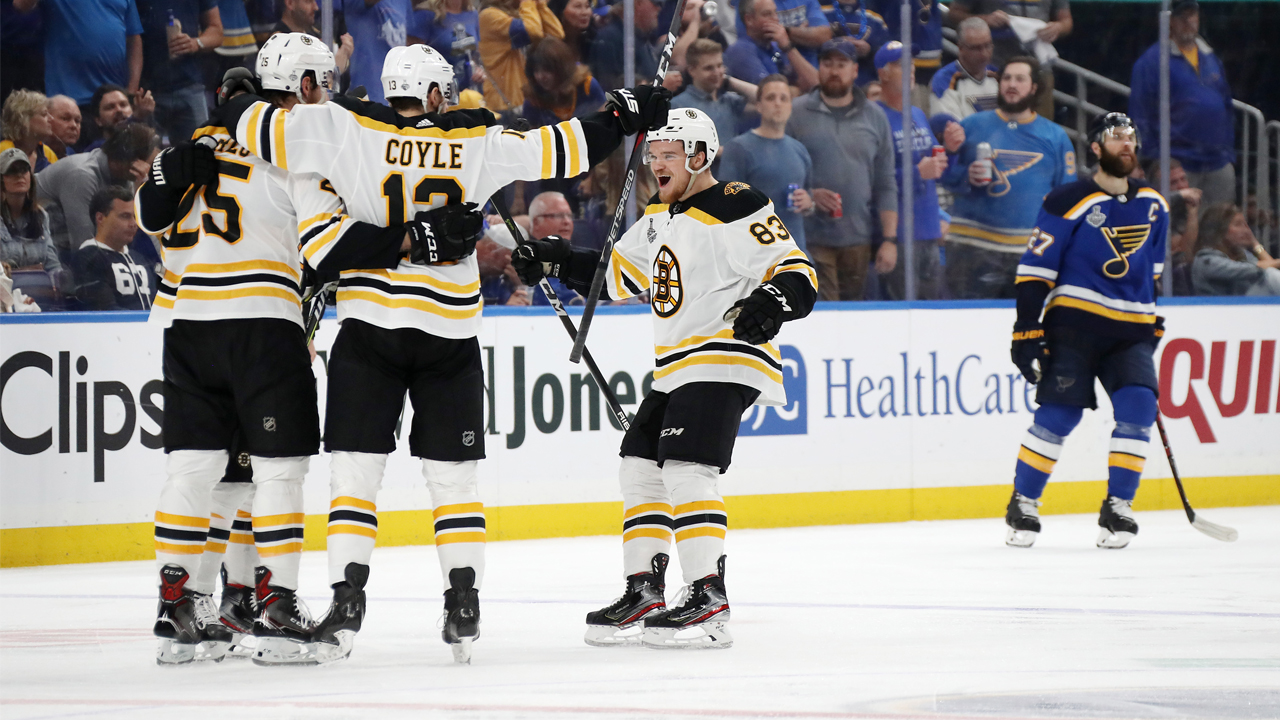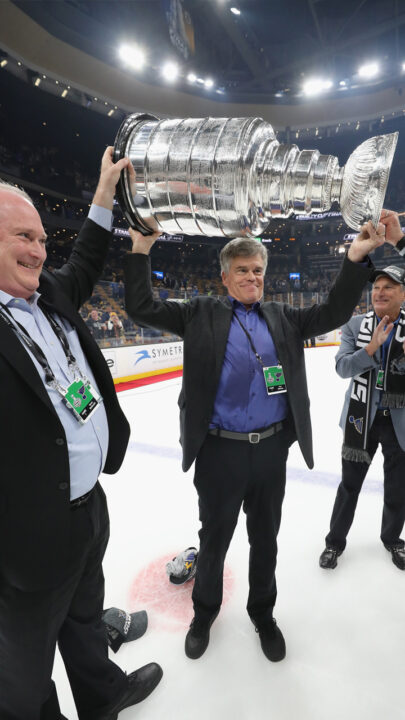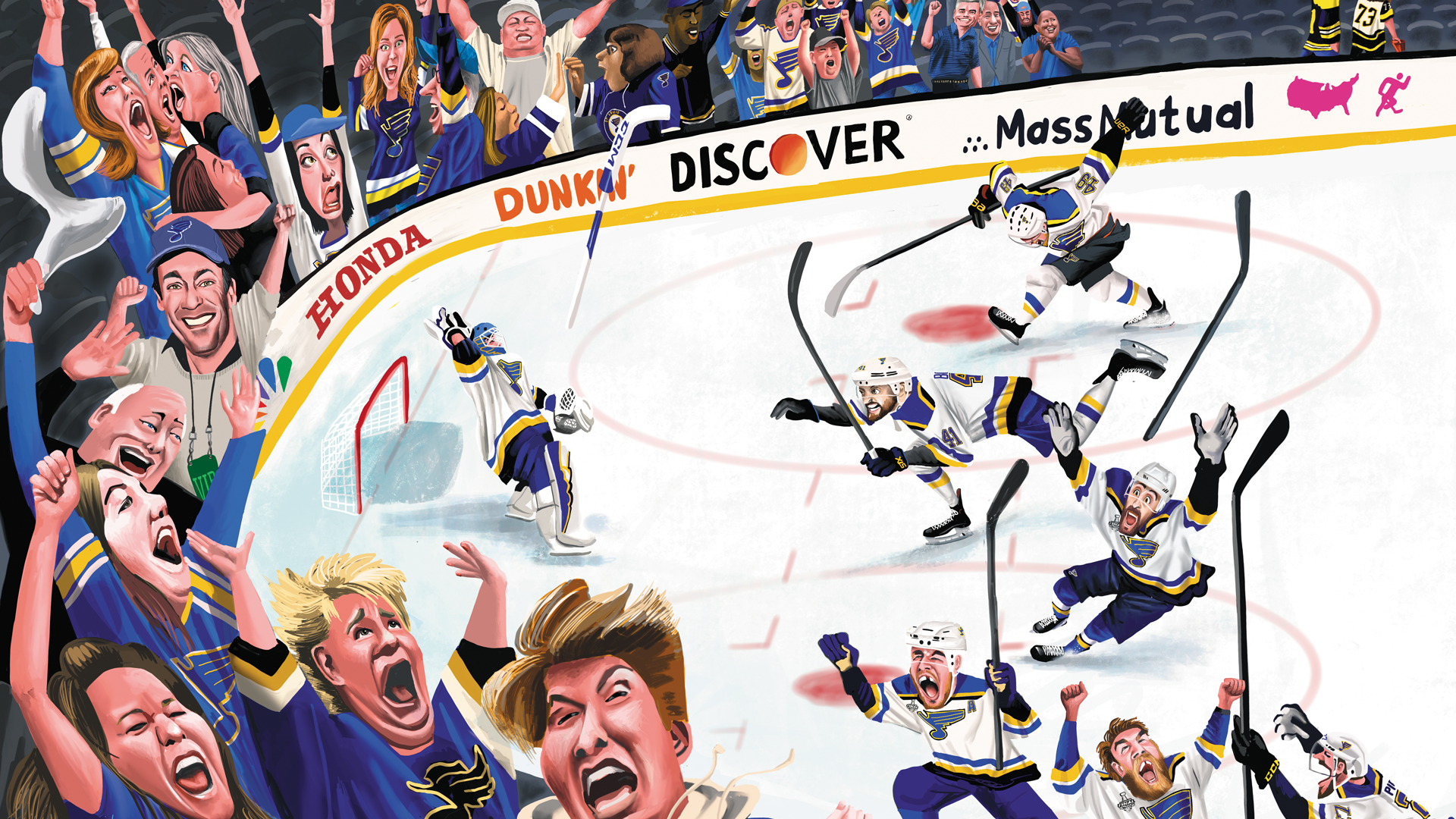To most outsiders, St. Louis is a baseball town. The way Busch Stadium frames the city’s famous arch makes the field itself an icon (11 World Series championships certainly don’t hurt either). And, until four years ago, the Gateway to the West was also home to a beloved football team—before a now reviled owner uprooted the Rams to Los Angeles. But hockey? The long-lovable Blues had always been a local passion.
A source of pride, excitement, and precisely zero championships. But, on a sunny day last June, St. Louis was at the center of the hockey universe.
While Game 6 of the Stanley Cup is always popular, St. Louis fans had pushed even the cheapest seats past $2,000; the best seats were going for about $10,000 apiece. The real crowd, though, was outside the stadium. Fans started flowing in hours before the game by the hundreds, thousands, and eventually tens of thousands. The tension was palpable—the city was ready to celebrate.
“I’m really anxious right now,” said Tom Stillman ’74, the chairman and governor of the St. Louis Blues, walking through the bowels of the arena two hours before the puck was set to drop. “I feel a little anxious every game, but nothing like today.”
After a 52-year wait, the Blues were only one win away from hoisting the Stanley Cup. The trophy was in the building, a fact that Stillman seemed well aware of. It was, after all, his responsibility to get St. Louis’s name etched on the Cup. “I’ve been right next to it, but I’ve never touched it,” he said, of what could arguably be considered one of the grandest prizes in all of sports. “In the hockey world, you don’t do that unless you’ve won it.”
Skating for the Stanley Cup was never a realistic goal for Stillman. He was a slight 90 pounds when he started high school and never made the varsity team, which was stacked with players who would go on to play Division 1 hockey. Nevertheless, he continued playing club hockey through his teen years and was eventually recruited to play for the Panthers. His Middlebury linemate Rob McCallum ’74 said that, although Stillman was by no means untalented, “no Middlebury hockey player is going to win the Stanley Cup as a player.”
Stillman has instead made his name as an unassumingly shrewd hockey executive, stabilizing a tenuous financial situation for the organization (previous years of mismanagement under different ownership had left the club hemorrhaging money) while still building a competitive roster.
And while he’s not the type of sports owner who seeks the spotlight, he’s still approachable and available to fans on even the most tense game days. Before Game 6, he’s dressed in a short-sleeve blue polo, black pants, and loafers, and stops to talk to at least half a dozen people between the lobby of the arena and his office upstairs. Once inside, he gestures to a chair; his game-day jacket—a blue sports coat—is slung over the arm. That jacket has proved a good luck charm of sorts. “The lining is starting to come out of it,” he said, explaining, “I’ve been wearing that same coat since January.”
The first half of the 2018–19 season started out rough for the Blues. On January 3, 2019, the Blues’ record was a subpar 15-18-4. After playing 37 games (roughly 45 percent of the season), the Blues were at the very bottom of the NHL standings; Vegas put their odds of winning the championship at 250–1. Few teams had ever made the playoffs from that position, and none had ever raised the Stanley Cup. “We were dead last,” remembered Stillman. The team had recently fired their head coach and decided to make another drastic change. They pulled their veteran goalie in favor of a rookie, Jordan Binnington, a goalie with exactly 13 minutes of previous NHL experience. “He was number four on the depth chart,” said Stillman. But then, somehow, victories started piling up.
And so that blue blazer became everyday apparel for Stillman, right through the end of the regular season as the team surged to a playoff spot—finishing just one point behind the division leaders—and headed into the first round. A series victory against the Winnipeg Jets followed, then a seven-game nail-biting conference semifinal against the Dallas Stars, and, ultimately, a Western Conference victory against the San Jose Sharks.
On May 27, 2019, the Blues took the ice to play the Boston Bruins in the club’s first Stanley Cup in 49 years.
It was the same team St. Louis had faced the last time they were in the Cup in 1970, when they lost in four straight games. That made their all-time Stanley Cup record a perfectly dismal 0–12. Then they lost Game 1 of the 2019 finals, dropping to 0–13. Far from panicking, the team rebounded to win three out of the next four games, leaving them just one victory away from a championship. “For a long time it was hard to believe this was happening,” Stillman said. “Now it becomes more real.”
As St. Louis readied for Game 6, the city felt on the verge of a coronation. The local newspaper, the St. Louis Post-Dispatch, even accidentally sent out an electronic edition of the paper with a prewritten congratulatory thank-you note to the city written by Tom Stillman. As the game got under way, the Blues started snapping shots at Boston goalie Tukka Rask but none made it past the netminder. And with a little less than nine minutes gone in the first period, it was the Bruins who struck first on a power play one-timer from Brad Marchand. The goal quieted the crowd and led to fresh here-we-go-again worries among St. Louis fans.
But this year’s Blues, much like Stillman, had always loved to fight the hockey odds.

Tom Stillman grew up without a local professional hockey team to root for. He was born in 1952 and was raised in a suburb just outside of Minneapolis. (The city was without an NHL team until the expansion North Stars began play in Minnesota in 1967.) Stillman played peewee hockey on the outdoor frozen surfaces that give the Land of 10,000 Lakes its name. “I just thought from the beginning it was unbelievably fun,” he said, “this feeling of skating around. This freedom.”
It wasn’t until the North Stars arrived that he was able to upgrade his allegiance to the NHL. (The league added six teams that year, including the Blues.) Three years later, Stillman graduated from high school. Though he never made his talent-stacked scholastic team, his club play had caught the eye of coaches at Middlebury, and in 1970 he arrived in small-town Vermont; he soon found himself on campus as one of only a handful of students who found the bitter Vermont winters to be balmy.
Stillman started the fall playing soccer at Middlebury (he would be a part of two undefeated seasons) and spent his first winter on the first-year hockey team before getting the nod for varsity the following year. Stillman’s start with Middlebury hockey was less than auspicious.
At the time, the team had a limited supply of sticks—“Sher-Woods”—and upon ascendance to varsity each new player got his pick. With Coach Wendell “Wendy” Forbes ’51 watching on, Stillman grabbed one and started testing its flexibility—then, snap, it promptly broke in two. “That was my first up-close and personal experience with the coach,” remembered Stillman, who thought his chances of playing for the team had all but disappeared. Of course, the coach did give him a second chance, and he continued to suit up for the Panthers through his senior year.
Far from the biggest guy on the rink, Stillman was certainly among the grittiest. Once, while playing Norwich University, he received the butt end of a Cadet’s stick (an illegal, often dangerous, and always painful hit). In hockey, cheap shots aren’t forgotten. So in the postgame handshake line, Stillman met the Cadet with a bit of hockey justice. “Let’s just say he didn’t greet him with a handshake,” said teammate Rob McCallum, adding, “All hell broke loose.”
With that, Stillman earned the nickname Mad Dog.
McCallum met Stillman during their first year and describes him as an incredibly smart individual with a knack for competition. “He’s very tenacious and determined,” said McCallum, who was Stillman’s linemate for all four years and became his lifelong friend. “That’s how he was playing hockey at Middlebury, and he transferred those same skills to the business world.”
That fire is a Stillman trademark. “The things that he does, he does with great passion and intensity,” confirmed Chris Zimmerman, the president and CEO of the Blues, who has been with the team since 2014 but has known Stillman since they played together in the 1980s on the
St. Nicholas Hockey Club in New York City. Stillman is the first to admit that he’s not the best person to watch a hockey game with. “While the play is going, people don’t think I’m really any fun to be with because I’m very focused on the play,” he said. “I do get celebratory when we score a goal though, especially in these playoffs.”
But Game 6 gave little cause for celebration, as a tight 1–0 Bruin’s lead quickly turned into a 5–1 blowout. The championship would now be decided in Boston—a script that felt all too familiar to St. Louisans.
Boston is a graveyard of St. Louis losses. Since 2001, one-quarter of Boston’s 12 professional championships have come at the expense of St. Louis teams (twice with the Red Sox beating the Cardinals, once with the Patriots besting the Rams). Outside the TD Garden arena stands a statue of Bruins legend Bobby Orr airborne after scoring an overtime goal to win the Stanley Cup. It’s a moment so famous in Boston that it is simply referred to as “the Goal.” The opponent? The 1970 St. Louis Blues. It was the last time the team was in the Stanley Cup.
When Stillman became an owner of the Blues—as minority in 2007 and majority in 2012—he knew very well what he was inheriting: A decades long Stanley Cup drought, a fanbase starving for a championship, and a franchise that in 2012 was assessed by Forbes as the least valuable team in professional hockey. “It was probably voting with my heart more than my head,” he said about his decision to buy the financially struggling team. But for him, it was about more than hockey. “I don’t mean to be that altruistic or dramatic, but I think to a person, every member of the group was motivated at least in part by civic considerations.”
Stillman says he sees his group’s ownership as more akin to stewardship. Still, turning the team’s financial situation around required making tough decisions. It meant cutting 40 jobs from the organization (though the group brought many back as the franchise became healthier), and reinvesting those millions into long-lagging player salaries. The team brought on talents such as David Perron, Tyler Bozak, and All-Star Ryan O’Reilly.

Slowly, the Blues’ fortunes seemed to turn. As they did, Stillman quickly became a St. Louis hero, a stark contrast to the villainous owner of the city’s football team, Stan Kroenke. In 2016, Kroenke submitted a proposal to relocate the Rams to Los Angeles, claiming that the region was losing population and lagged in the necessary economic drivers to support the professional franchise. To locals, Kroenke’s reasoning amounted to a scorched earth proposal, essentially claiming the city was inching toward irrelevance. Despite efforts to save the team, the Rams left town and the city was left to lick its wounds.
As the anti-Kroenke of sorts, Stillman represents a perhaps rare breed of owner who cares not only for his bottom line but also the future of the team, the city, and the fans. Stillman has called St. Louis home for more than 25 years and makes a point to be as accessible as possible to the fanbase. “If you walk through the [Enterprise Center] with him before a game, the fans literally mob him,” says McCallum, who frequently attends games with Stillman. “They all want their pictures with him, they thank him for what he has done for St. Louis and the Blues. I mean, he’s a rock star in St. Louis; you’ve never seen anything like it.” Bringing home the Cup would deliver the ultimate punctuation for an ownership group that promised the city success on and off the rink.
Even before the puck dropped in Game 7, the noise levels at Boston’s TD Garden made conversation a fool’s errand. If Game 6 in St. Louis felt like a coronation, these Boston fans were ready to confer their team honorary sainthood. And for the first 15 minutes of play, it seemed difficult to fathom that the Blues could stop Boston’s momentum. But with the help of several circus-like saves from Binnington, the Blues managed to keep the game tied at zero. And then, with three minutes and 13 seconds remaining in the first period, Ryan O’Reilly put the Blues up 1–0. Another goal soon followed, somehow giving the Blues a 2–0 lead despite being outshot 12–4. And, after a scoreless second period, the Blues were just 20 minutes away from ending hockey’s longest title drought.
Stillman tries not to let himself think too far ahead, or drift into nostalgia. But, he says, his mind does sometimes wander—to the outdoor rinks in Minnesota and his time playing at Middlebury. “That’s a chance I probably shouldn’t have even gotten,” he said, before Game 6. “If I hadn’t been connected to hockey all this time, this probably wouldn’t have happened.”
The Stillman family has long heard about Tom’s time at Middlebury. His daughter Isabelle remembers stories about Professor Murray Dry and first-year hijinks in Hepburn Hall, including one student who apparently kept a monkey in their room. “Growing up, I wanted to go where my dad went,” she said, and eventually she enrolled in the Class of 2016. During her sophomore year she even lived in Hepburn—which, while a monkey-free experience, only further solidified her connection with her dad. “Now we have a shared second language,” she said, “a shared second home.”
As the Blues continued their improbable run through the playoffs, Stillman found a way to bring parts of Middlebury with him. Rob McCallum, his linemate, joined him in the owner’s box for the first six games of the Stanley Cup, only to have his plane to Game 7 in Boston divert, midroute, due to mechanical problems. Isabelle, along with the rest of Stillman’s family, did make it—all watching as the Cup inched closer.
In hockey it is often said that there is nothing more dangerous than a two-goal lead, but on that cool New England night in June, the Blues simply would not relent. And with just over eight minutes left in the third period, the Blues took a commanding 3–0 lead and never looked back. After 52 years, the wait was over. The St. Louis Blues were Stanley Cup champions.
In a flurry of gloves, sticks, and helmets, players rushed the ice. The Boston fans had started to trickle out of the stadium much earlier, leaving room for the St. Louis fans to make their way toward the rink to help celebrate the end of hockey’s longest wait. Soon, Lord Stanley’s Cup had joined the ruckus.
The captain Alex Pietrangelo was first to hoist the 34-and-a-half-pound trophy, which then made its way from player to player. As the team made celebratory laps around the rink, Stillman stood humbly to the side with his family.
With each handoff, Stillman got closer to the Cup. And, at exactly 11:00 p.m. EST, he finally hoisted the Stanley Cup. “It will probably be something with kids’ hockey in St. Louis,” said Stillman on his plans for his day with the Stanley Cup—a hockey tradition.
“But,” he added with a grin, “there is a part of me that would like to bring it to Middlebury.”
Tik Root ’12 contributed reporting to this story

Leave a Reply